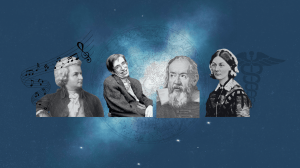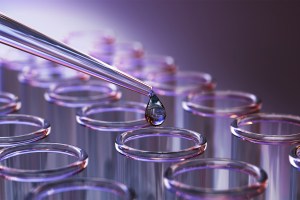Tag: Science
-
Health
President testifies for increase in NIH funding
With the careers of a generation of young researchers threatened by five years of flat National Institutes of Health (NIH) funding, Harvard President Drew Faust and leaders of six other major research institutions were in Washington Tuesday (March 11) calling on Congress to repair the “Broken Pipeline” through which breakthroughs in the biomedical sciences should…
-
Health
Ecologist Jeremy Jackson to receive Roger Tory Peterson Medal
Jeremy Jackson, renowned marine ecologist of the Scripps Institution of Oceanography, has been selected to receive the 11th annual Roger Tory Peterson Medal presented by the Harvard Museum of Natural History (HMNH). Jackson will deliver the Roger Tory Peterson Memorial Lecture on April 6 at 3 p.m. in the Science Center, 1 Oxford St.
-
Health
HSPH establishes new three-year grant program
The Harvard School of Public Health (HSPH) has announced the establishment of the A.G. Leventis Foundation Fellowship Program with a three-year grant to support Cypriot/Greek and Nigerian students and scholars in public health.
-
Health
Of flies and fish
During her schooldays in 1950s Germany, Christiane Nüsslein-Volhard rarely did her homework. In 1995, she won the Nobel Prize for physiology and medicine. Volhard is now director of the prestigious Max Planck Institute for Developmental Biology in Tübingen, where, decades before, she had been an undistinguished biochemistry undergraduate. She was at Harvard this week (March…
-
Health
Gene variants probably increase risk for anxiety disorders
Massachusetts General Hospital (MGH) researchers — in collaboration with scientists at the University of California, San Diego, and Yale University — have discovered perhaps the strongest evidence yet linking variation in a particular gene with anxiety-related traits. In the March issue of Archives of General Psychiatry, the team describes finding that particular versions of a…
-
Science & Tech
Pioneer in spintronics celebrates birthday
What might be Harvard’s oddest birthday party unfolded last week (Feb. 29-March 1). In a lecture hall at Maxwell Dworkin, 50 physicists gathered to share the latest research in spintronics, an emerging branch of their science concerned with the quantum spin states of electrons.
-
Health
Biologist Venter will be visiting scholar at Origins of Life Initiative
J. Craig Venter, the visionary biologist and intellectual entrepreneur who was a leading figure in the decoding of the human genome, will join Harvard University as a visiting scholar at the University’s Origins of Life Initiative.
-
Health
Portion of encyclopedic ‘macroscope’ unveiled
The first 30,000 pages of a massive online Encyclopedia of Life were unveiled last week at the Technology, Entertainment and Design (TED) conference in Monterey, Calif. The project was congratulated by E.O. Wilson, Pellegrino University Professor Emeritus, who articulated the need for a dynamic modern portrait of biodiversity in a widely read essay in 2003.…
-
Health
University, students unite for mental health
If a student is struggling, stressed-out, or having trouble coping with pressure, the University is here to listen and help. That’s the theme behind this year’s “Speak Out, Mental Health at Harvard,” a weeklong series of events to engage the student body in active campus dialogues about mental health.
-
Health
A doctor without borders
Oleksiy Skrynnyk was just a carefree 9-year-old, his fishing rod slung over his shoulder as he walked home from his favorite pond. He never saw the low-hanging power line. Twenty-two hundred volts shot through his body, entering his right shoulder and exiting out his left foot. The electrocution burns were extensive. His right arm was…
-
Health
Joint Harvard-Brazil program fights entrenched diseases
Recently (Jan. 6-21), 15 Harvard and 16 Brazilian students participated in an intensive experience: the first Harvard-Brazil Collaborative Course on Infectious Diseases. The course, which was offered by the Harvard School of Public Health (HSPH) and the Santa Casa de Misericórdia de São Paulo Medical School (FCMSCSP) with the support of the Harvard University Brazil…
-
Campus & Community
Papers, workshops, tours light up energy meeting
Harvard is already famous for its experts in languages, law, medicine, government, and literature. Now you can add heating and cooling.
-
Campus & Community
HSPH offers scholarship opportunity
The Harvard School of Public Health (HSPH) recently announced a new scholarship opportunity for students and scholars from Southeast and East-Central Europe.
-
Arts & Culture
HUL launches extensive ‘Contagion’ collection
The Harvard University Library (HUL) Open Collections Program recently launched http://ocp.hul.harvard.edu/contagion. Created with support from Arcadia, the new collection, titled “Contagion: Historical Views of Diseases and Epidemics,” brings carefully selected historical materials from Harvard’s renowned libraries, special collections, and archives to Internet users everywhere.
-
Science & Tech
Finding ingenious design in nature
“This,” Joanna Aizenberg says slyly, picking up a latticed tube from her desk in Pierce Hall, “is a glass house you can throw stones at.” The tube, tapered to a close at one end and festooned with a cluster of curious white fibers at the tip, resembles an upturned dog’s tail. It is, in fact,…
-
Health
‘Attentional collapse’ causes an inability to imagine future satisfaction
Researchers have identified a key reason why people make mistakes when they try to predict what they will like. When predicting how much they will enjoy a future experience, people tend to compare it to its alternatives — that is, to the experiences they had before, might have later, or could be having in the…
-
Health
From adult to embryonic stem cell
Harvard Stem Cell Institute (HSCI) and Massachusetts General Hospital (MGH) researchers have taken a major step toward eventually being able to reprogram adult cells to an embryonic stem cell-like state without the use of viruses or cancer-causing genes.
-
Science & Tech
Impact of global warming on health debated
Disagreement over the public health impact of global warming emerged in a symposium Monday morning (Feb. 18) at the annual meeting of the American Association for the Advancement of Science. The colloquium, titled “Sustaining Human Health in a Changing Global Environment,” addressed what hazards can be expected as a result of rapid and continuing climate…
-
Health
Americans split on socialized medicine
During the course of the presidential nomination campaigns, some candidates’ health care plans have been described as “socialized medicine.” Historically, that phrase has been used to criticize health reform proposals in the United States.
-
Campus & Community
Newsmakers
Three faculty elected to NAE, Linnean Society of London honors Wilson, Arthur Kleinman serves as Cleveringa Professor, Faculty earn Smith Breeden Prize, Pair wins prestigious NSF award, ‘Father of World Wide Web’ to receive Pathfinder Award
-
Health
Newly identified gene variants associated with prostate cancer risk
Three studies presenting newly identified genetic variants that are associated with increased susceptibility to prostate cancer were published recently (Feb. 10) on the advance online site of Nature Genetics. The 10 gene variants double the number of known variants associated with risk of the disease and are the result of genomewide association studies.
-
Health
Anxiety linked to overestimation of breast cancer risks
Elevated levels of anxiety may cause women with ductal carcinoma in situ (DCIS), the most common form of noninvasive breast cancer, to overestimate their risk of recurrence or dying from breast cancer, suggests a study led by researchers at Harvard-affiliated Dana-Farber Cancer Institute in Boston.
-
Health
Infants are able to recognize quantity
By looking at infant brain activity, researchers have found that babies as young as 3 months old are sensitive to differences in numerical quantity. Additionally, the scientists were able to see that babies process information about objects and numbers in different, dissociated parts of the brain, which is also the case in older children and…
-
Health
Web technology allows health experts from around globe to kibitz
It was close to midnight one day this week in Durban, South Africa, when Harvard AIDS researcher Bruce D. Walker switched on his computer and made a visit to 104 Mt. Auburn St. in Cambridge.
-
Health
BWH-led tuberculosis research project receives $14M NIH grant
Researchers at Brigham and Women’s Hospital (BWH), the Harvard School of Public Health (HSPH), Harvard Medical School (HMS) and Partners In Health (PIH) have received a grant of $14 million over five years from the National Institutes of Health to study multi-drug-resistant tuberculosis (MDR-TB) and extensively drug-resistant tuberculosis (XDR-TB). The goal of the project is…
-
Health
Making statistics not just palatable, but delicious
Money, love, health, innocence or guilt — even finding the right wine. Who doesn’t want to know more? “Real-Life Statistics: Your Chance for Happiness (or Misery),” offered this semester by Harvard’s Department of Statistics, will explore the critical tools to make good judgments in matters large and small.
-
Health
How brain cells make good connections
Harvard neuroscientist Venkatesh N. Murthy has a sunny second-floor office on Divinity Avenue, where he is a professor in Harvard’s Department of Molecular and Cellular Biology. In one corner is a set of weights and a soccer ball — both untouched in over a year, he said, because of an intensely busy schedule.
-
Campus & Community
Harvard to collect, disseminate scholarly articles for faculty
In a move to disseminate faculty research and scholarship more broadly, the Faculty of Arts and Sciences (FAS) voted Tuesday (Feb. 12) to give the University a worldwide license to make each faculty member’s scholarly articles available and to exercise the copyright in the articles, provided that the articles are not sold for a profit.
-
Campus & Community
Newsmakers
Taubes awarded NAS prize, School of Dental Medicine receives ADEA Award for Vision, Ph.D. candidates receive Kauffman Dissertation Fellowships, Peter Black elected to lead WFNS, HHL-Leipzig honors Porter, Stone receives Batchelor Prize
-
Health
Cancer stem cells can be targeted for destruction
It’s increasingly believed among scientists that nearly every cancer contains small populations of highly dangerous cells — cancer stem cells — that can initiate a cancer, drive its progression, and create endless copies of themselves. On the theory that targeting these cells might be an effective therapeutic strategy, researchers around the world have begun isolating…


